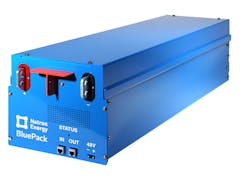How Sodium-ion Batteries Can Support eGSE
As the ground support industry continues to seek efficient solutions to lower carbon emissions, more ground service providers are turning to electric ground support equipment (eGSE). The interest in electrifying fleets has resulted in numerous battery technologies being developed for GSE-specific applications.
For example, representatives at Natron Energy have worked with key stakeholders in aviation, including United Airlines, to demonstrate how sodium-ion batteries can benefit the ground support market.
According to Brian Kennedy, director of business development and marketing at Natron Energy, sodium-ion batteries can be utilized to electrify all forms of GSE, including baggage tugs and pushback tractors. They can also be used to power GSE charging stations.
“Any GSE that currently exists with gas or other batteries has the potential to use sodium-ion batteries as a way to efficiently hold and charge power. Natron’s batteries also allow airport operators to manage electricity demand and efficiently handle GSE charging,” Kennedy says.
“United Airlines Ventures was created to identify companies spearheading the next generation of innovative and emissions-reducing technology,” Michael Leskinen, president of United Airline Ventures, said in a press release announcing its investment in sodium-ion battery technology. “Out of the gate, we primarily focused on technology designed to help reduce carbon emissions from our airplanes. Natron’s cutting-edge sodium-ion batteries presented an ideal opportunity to both potentially expand our sustainability investment portfolio to our ground operations and to help make our airport operations more resilient. United is looking forward to future opportunities to work with our airport partners on sustainable technology initiatives.”
Sodium-ion batteries use sodium as the electrolyte in the battery instead of lithium or lead. According to Kennedy, Natron manufactures a distinct type of sodium-ion battery that stores energy in the form of sodium ions – or salt ions – in a material called Prussian blue.
“Prussian blue is a common pigment found in a range of consumer products from paint to blue jeans. Its particles have pores that can soak up sodium ions in the same way that a sponge’s pores soak up water,” he explains. “Our battery design enables the pores to soak up sodium ions extremely quickly (fast charging) and release them extremely quickly (rapid discharge at high power). They can do this over and over and over again without breaking down the Prussian blue particles, enabling longer life and safer operation.”
Because Natron’s sodium-ion batteries are made without lead or lithium, Kennedy explains that they are nonhazardous and nonflammable.
“The batteries can operate in an extremely wide temperature range, -20 degrees C to 50 degrees C, and cannot be induced to thermal runaway,” Kennedy says.
Low cost and environmental friendliness make sodium-ion batteries appealing, according to Kennedy. In addition, he notes the minerals used in sodium-ion batteries are abundant across the world and can be easily, safely and ethically sourced.
“Natron’s sodium-ion batteries can be disposed of as universal waste at any general waste processing site because they do not include materials hazardous to the environment,” Kennedy says.
Because sodium-ion batteries are non-flammable, they pose no risk around aircraft or near jet fuel.
“They can be safely deployed into GSE and are safe in close proximity to airplanes. The wide temperature range that Natron’s batteries can operate in makes them appropriate and efficient in airport operations,” says Kennedy.
Sodium-ion batteries can help decarbonize the GSE industry by decreasing emissions produced on the ramp. Sodium-ion batteries deliver high power quickly and over short distances, which Kennedy points out is exactly how GSE works.
Plus, a fast recharge helps prevent ground handling delays. Unlike other battery chemistries, Natron’s sodium-ion batteries recharge from near-depleted status without concern for wet soaking or the risk of the battery being beyond chargeable, Kennedy points out.
“Natron batteries charge/discharge quickly and deliver full-rated capacity. They completely recharge to 100 percent, compared to only 80 percent of recharge energy captured in other battery chemistries. Natron batteries also recharge in a quarter of the time required for lithium-ion batteries and 1/32 of the time for lead-acid batteries,” he says, adding sodium-ion batteries need no additional service beyond the industry standard practice of ensuring the proper lug torque on interconnections.
While United Airlines has invested in sodium-ion battery technology with an eye on further electrifying its GSE fleet, Natron has recently received a request from the Department of Energy to provide a proof of concept for the first-ever eVOTL (electric vertical take-off and landing) aircraft hub and has been asked to install a GSE EV fast-charging infrastructure system at a major commercial airport.
“Natron is currently working behind the scenes with various manufacturers in early-phase testing to use its batteries in GSE,” Kennedy adds. “No batteries are currently deployed in airport sites.”
Sodium-ion is a relatively young chemistry, Kennedy says, so the industry and scale aren’t as developed as other chemistries. Additionally, existing GSE must be reconfigured to fit sodium-ion batteries, which also takes time.
However, Natron is currently retrofitting a plant in Holland, Mich., for commercial-scale production.
“Natron’s sodium-ion batteries will help the aviation industry achieve its decarbonization and EV goals,” said Colin Wessells, CEO of Natron Energy. “Our batteries provide the high power over short distances that ground service equipment needs, and unlike lithium-ion, Natron’s batteries are completely nonflammable and can be safely deployed into ground service operations.”
About the Author
Josh Smith
Editor
Josh Smith served as editor of Ground Support Worldwide as editor from 2016 through 2024. He oversaw production of the print magazine, created GSW's newsletters on a daily basis, and updated the latest news on AviationPros.com.

